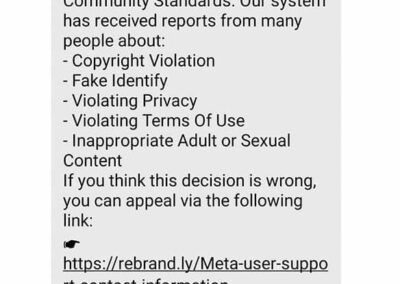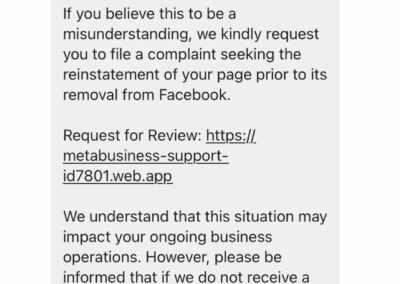Protecting Your Facebook Page
How to Prevent Permanent Deletion Scams
Scammers are getting more creative by the day, and one common tactic is to send deceptive messages about the permanent deletion of your Facebook page, claiming it’s due to alleged trademark infringement. These scams can be alarming, but with a little vigilance and the right knowledge, you can protect yourself. Here’s how:
1. Verify the Source:
Always double-check the sender’s profile and message. Legitimate notifications from Facebook will be sent from official Facebook accounts or email addresses.
2. Don’t Click Suspicious Links:
Avoid clicking on any links in the message. Instead, visit your Facebook account by typing the URL directly into your browser or using the official Facebook app.
3. Confirm Legitimacy:
If you receive a warning about trademark infringement, verify it through official channels. Reach out to Facebook support through their website to confirm the authenticity of the message.
4. Enable Two-Factor Authentication (2FA):
Protect your Facebook account by enabling 2FA. This adds an extra layer of security, making it more difficult for scammers to access your account.
5. Use Strong, Unique Passwords:
Create strong, unique passwords for your online accounts, including your Facebook profile. A combination of letters, numbers, and symbols is recommended.
6. Beware of Urgency:
Scammers often create a sense of urgency. Take your time to investigate before taking any action.
7. Educate Yourself:
Stay informed about the latest online scams and tactics. Knowledge is your best defense.
8. Report Suspicious Activity:
If you receive a suspicious message, report it to Facebook and the appropriate authorities. This can help protect others from falling into the same trap.
9. Think Before You Click:
Always think twice before clicking on any link or downloading files from unknown sources. Scammers use enticing links to steal personal information.
10. Keep Your System Secure:
Use up-to-date antivirus and anti-malware software to protect your devices from malicious software.
11. Communicate with Colleagues:
If you’re part of a team managing a Facebook page, ensure everyone is aware of these potential scams and the necessary precautions.
Remember, the key to prevention is vigilance and skepticism. Don’t be quick to panic or take immediate action when you receive alarming messages. Take the time to verify their authenticity and ensure your online security.
By following these steps and staying informed, you can better protect yourself and your Facebook page from scams and malicious activities. Stay safe and enjoy your online experience.






